- Home
- Lisa Wingate
The Sea Keeper's Daughters Page 5
The Sea Keeper's Daughters Read online
Page 5
Clyde had apparently salted the ground in front of me. Had he purposely arranged things so that if I ever came here, I’d find the whole town against me from the beginning? Who could say what the man was capable of? He’d manipulated a woman who was on heaven knows what medications, persuaded her to bequeath use of the building and its income to someone she’d only been married to for four years. I had no idea whether the woman who’d changed her will only weeks prior to her death bore any resemblance to the one who’d carefully labeled each of these cardboard containers. Christmas, Easter, Fourth of July. Exterior twinkle lights. Window candelabras. Wreath and garlands. My mother had been a lover of all seasons and every holiday. After years of teaching, she owned enough decorations to liven up even a place as large as the Excelsior.
In her e-mails to me, she’d written about how much she adored being one of the full-timers in Manteo. She’d even been in the annual outdoor theater presentation twice before the cancer had come back. Like others on the Outer Banks, she saw assuming a role as one of Sir Walter Raleigh’s Lost Colonists not only as a way of preserving history and entertaining tourists, but also as a bit of a lark. Among the citizens here, it was a badge of honor to discuss which characters you’d played over the years. In her younger days, my red-haired mother would’ve been perfect for the coveted Queen Elizabeth role. As it was, she was happy to play bit parts and help with the musical end of the show.
Standing here by her boxes, I tasted the regret of having been held up by a restaurant disaster the one time I’d planned to come watch her perform in the amphitheater that housed the Lost Colony drama. I should’ve dropped everything and made the trip, no matter what.
Now here I was, left with only the remnants of her. The crushing nature of the task struck me as I looked down the hall. This place needed so much more than a quick sweep to see if anything remained that could be sold to save Bella Tazza 2. Yes, there were mountains of hotel castoffs and family heirlooms to deal with, but my mother’s life—things she cared about—remained here too. I needed time to consider how best to honor her, how to treat these items with reverence, finding the right place for each one, the right person to put to good use what I couldn’t bring home. My aunts would want some of her things. Which ones? What should be saved and what should be let go?
Whit’s baby clothes, the masking-tape label on a green plastic tub read. She’d probably saved those things in hopes of grandchildren.
At thirty-eight, that was looking less and less likely for me. Yet despite my wanderings, my consuming drive to prove myself in the business world, and my hasty-then-disastrous marriage, my mother had clung to the hope that I would one day settle down in a little white house with someone who really loved me. Someone with whom I would start a family of my own.
The familiar lump swelled in my throat—the one that came with thinking of all the milestones my mother and I would never share. I swallowed hard, sighed out regret. I hoped she knew, even though I’d been stubborn, even though I’d insisted on culinary school and a career far from home, that she wasn’t the one I’d been running from. Maybe, in truth, that restless spirit was as much an inheritance as whatever remained in this building, where my father’s father had come and gone from the harbor. Perhaps it was the very thing Grandmother Ziltha had disliked in Benjamin Benoit, the adventuring husband with whom she’d once taken over ownership of this grand hotel. They’d shared less than eight years before he’d vanished at sea off Cape Hatteras in 1936. Perhaps I was plagued by the stirrings of my ancestors, who’d heard the siren songs of faraway places, who’d left home again and again to wander.
I felt their whispers, sensed their stories seeping from the walls as I moved down the hall, beyond my mother’s stored items, deeper into the past. The first two rooms on either side were filled with hotel equipment—the enamelware rolling carts once used by the maids, shelves stacked with china pitchers and water glasses. Blond bedsteads and dressers hailing from the sixties. Any antiques of value had been sold when the rooms were updated. What remained from the Excelsior’s last years of business added up to little more than a removal nightmare, now that the freight elevator used by Old Dutch, the porter, no longer worked. My mother hadn’t seen the point in fixing it after the motor died. She’d lacked the funds, anyway. We need the exercise of walking the stairs, she’d told me. Clyde, especially, with his bad circulation.
Someday when you’ve got time to sort through what’s left from your grandmother Ziltha, you can figure out how to get rid of all the junk. We’ll hunt up some big, burly guys to move things. Maybe a little good will come of that and I’ll get some grandbabies before I’m too old to enjoy them.
Mom … , I’d warned, feeling the familiar tightness and resentment stiffen my spine. Why wasn’t a corporate career that allowed me to travel around the world, to live in resorts and upscale hotels, to eventually start my own business, good enough? Why, always, the pressure to consider a road other than the one I’d taken?
Now I wished that instead of scolding her, I’d simply said, Well, Mom, maybe one of these days, right? If my soul mate happens along. I love you, you know.
Why had we always been locked in the subtle battles of mother and daughter, each convinced we were right about what was best for the other?
I hope she knows how much I loved her.
Moving on from the first couple rooms, I continued down the hall to the ones near the elevator, where Grandmother Ziltha’s possessions had been stored after she passed away. I’d turned eighteen that spring. A scholarship had taken me to Paris for a summer work-study prior to starting culinary school.
The Excelsior had been closed for two years by then, Grandmother Ziltha’s declining mental state making it impossible to keep the place going. Mom’s e-mails to me had described the sad condition of the third-floor residence, now a disjointed shadow of its former glory. With Lucianne in a nursing home and Old Dutch dead, there was no one to stop a dishonest home health worker from taking my grandmother’s fur coats, jewelry, silver services, even antique furniture, as she came and went from the Excelsior. When questioned, she said those things were gifts, given to her out of Ziltha’s gratitude. Mom had no way of proving otherwise, nor could she afford the legal battle over it. She simply did the best she could, moving most of the remaining valuables and the smaller antiques down to the second floor, where she could lock them away before leasing out the third floor.
I don’t want you to have to bother with that stuff, Mom, I’d told her, the bluntness easier via e-mail. Just sell it. I can use the money to stay in Paris for school, long-term.
Her reply had been gentle but determined. I’ll let you go through it when you have the chance. Your father’s baby photos are there, and his school records and other family mementos. That’s your history on the Benoit side. Just leave it be until you have time for it.
As often was the case, she’d been right in the long run. Now, the fact that I hadn’t squandered the funds from this building on a stint in Paris seemed like a gift. Whatever remained in the packed rooms next to the elevator shaft and the open lounge area could offer salvation for Bella Tazza. Letting go of these things was a small sacrifice compared to preserving the jobs of thirty-five hardworking people.
Around me, boxes and furniture and gray moving pads formed an odd sort of fruit, each ripe with possibility. No telling where I should begin or exactly what I was looking for. I was certainly no antiques expert, nor did there seem to be any sort of organizational system here. The heavy mahogany dressers with ornate mirrors, the tall bedstead leaning against the wall under a dirty canvas drop cloth, the lovely upright piano my grandmother played beautifully, the dining room suite, the hall tree, the massive gilt-framed mirror that had hung in the living room, all were impressive, even covered with dust. They undoubtedly had value, but getting them out of here would be almost impossible without the elevator.
The boxes made the most sense as a starting place. Boxes and dresser drawers and china cabinets.
I needed small things I could easily transport, possibly even to the antique store I’d passed on the way into town.
“I guess … here we go,” I whispered into the quiet air.
Crossing through the maze, I moved to a wardrobe and a stack of bookshelves that stood together along the salon wall. The bottom drawer of the wardrobe squealed in protest at being dragged open. The space inside was filled with hats and gloves. Despite the summer heat and laid-back atmosphere of the Outer Banks, my grandmother had never gone anywhere without both, her habits left over from an era when meticulous propriety controlled women’s lives.
Squatting above the dusty floor, I dug through the contents, temporarily lost in intricate patterns of seed pearls, colorful glass beads, swirling feathers, and the milky shapes of embroidery. A matching pair of gloves lay folded with each hat, the adornments carefully coordinated. No doubt the sets had been created by artisans who were well known in their day. Everything about Ziltha Benoit spoke of the wealth and position with which she had been raised.
The leftovers were interesting to ponder, but not the sort of things I needed. Maybe my mother’s theater group could use them as costumes. In an odd way, my grandmother probably would have liked that. She’d always supported the arts.
I stood and opened the wardrobe cabinet next. Dresses hung inside, the type that would have sheathed my grandmother’s long, thin frame far before I ever knew her. The finery of a young woman. Beaded and sequined, they must’ve been pricey, worn to cocktail parties, receptions, and invitation-only dinners among the Outer Banks’ most well-known families, or perhaps in Virginia Beach and Norfolk, where the coastal elite supported museums, historical societies, and other philanthropic ventures. In her younger years before the falling-out with her family, she’d involved herself in the business. After the estrangement, she’d withdrawn to the hotel and Roanoke Island, subtly letting her resentment be known by her refusal to keep up appearances.
Standing here among her belongings, I felt as if she were watching me from some darkened corner, pointing that craggy finger and saying, Do not touch, young lady!
Her voice was so clear, I paused to listen, to recall the way the languid Old South tones of her Charleston upbringing had given even the harshest commands a musical quality. She’d never called me by my name. I was always child or girl or young lady. The name Whitney was too modern and lacked sophistication, she said, so she refused to use it. Her habit of addressing me was, instead, a perpetual scolding. Those years of navigating her tutelage and the staff of the Excelsior had prepared me for the sometimes-brutal process of working my way up from prep cook to executive chef to corporate manager to business owner. It was proof that sometimes the hardest things in life become the building blocks of the greatest achievements.
There’d been a bit of Grandmother Ziltha in that standoff with Tagg Harper in the Bella Tazza 2 parking lot too. She and I did have a few things in common, stubbornness being one and determination to cling to what was ours being another. She wouldn’t have liked the idea of my selling off her belongings.
“You’d probably do the same thing, if you were in my shoes. You’d never let someone like Tagg Harper come out on top,” I told her as I continued around the room, searching empty dresser drawers, where an occasional yellowed hankie or stocking lay curled in nests of string, wavy gray hair, and dismembered bug bodies. Broken bits of jewelry slid across drawer bottoms and drew trails in the dust. A small, pearlescent box offered up a smattering of spelling bee awards, a Red Cross emblem, a locket, a baby ring, club pins, and a Daughters of the American Revolution Medal of Honor—things Grandmother Ziltha had saved to the last of her life.
Their only value was sentimental now. I left them where they were and moved on to a pile of boxes along the west wall. The dust-draped labels bore my mother’s handwriting. Ziltha’s books. Upstairs, what was now a closed-off room had once been the domain of important men. In years past, its heavy mahogany desk and bulky leather chairs had been privy to the private conversations of the sea captains and shipping magnates who gathered to speak with Benjamin Benoit. During his travels, he’d amassed a world-class library that had stretched from floor to ceiling, the enormous bookshelves woefully overburdened.
No one ever read the books, as far as I could see, and when I came in the summers, I, like the household help, had been forbidden to touch them. They were fragile and of no interest to a girl my age, I was told. Instead, a stack of books from the public library always awaited me in the room I shared with my mother at the end of the hall. I read Grandmother Ziltha’s selections occasionally, but Anne of Green Gables and Jane Eyre felt a bit too close to life during those summers. For the most part, I was too tired to read anyway. If I wasn’t too tired, I was sneaking down the fire escape, looking for new friends or cute boys.
What might be among these books I’d always been told not to touch? Perhaps some of them really were valuable. It was worth checking, anyway.
I lifted a box from the stack, lugged it to a cracked vinyl chair and looked inside, coughing at the haze of old paper, dried glue, and decaying binding tape. The contents actually seemed to be in pretty good shape, but the box was filled with nothing more than outdated encyclopedias. Those hadn’t come from the drawing room. The only encyclopedia set in my grandmother’s house had belonged to her maid, Lucianne, and had stayed in Lucianne’s room upstairs. Grandmother Ziltha had thought it a ridiculous expense for a maid to incur, and she was angry that Lucianne had let a traveling salesman bamboozle her into making the purchase. My grandmother also thought I needed to be reading the classics rather than perusing photos of baboons in Africa and Aborigines in Australia. Uncivilized, she had said.
Even reading the encyclopedias had been a tiny act of rebellion, once. I couldn’t imagine what it must have been like for my father, growing up under Ziltha Benoit’s domineering eye. The ivy-laden boarding schools in Virginia must have seemed like welcome vacations.
Setting the book back in its place, I put the lid on the box and walked back to the pile. Something caught my eye as I tried to wrestle another container free … something I … recognized? Even with a drop cloth lying over it, the slanted top of an old captain’s desk was unmistakable. The desk had always stood in an alcove of the library, a holdover from Benjamin Benoit’s seafaring travels, according to family lore. Of all the things in my grandmother’s house, this was the one that had most inspired my childhood imagination.
A tug on the dry-rotted covering revealed the beautiful gilded-edged writing surface, the inlay bright and surprisingly free of patina. Leaning across the mountain of cardboard, I caught a glimpse of the ornate cabriole legs and bun feet. “There you are,” I whispered, and realized that in some way I’d been hoping for this. Seeing the desk was like reuniting with an old friend.
On evenings when my grandmother was away with her bridge club or gone for other social engagements, I’d sneaked into the library and sat in the wobbly, narrow-legged chair at the small davenport desk. Perched there, I wrote, drew pictures, read books, and dreamed of foreign lands. Distant foghorns and boatswains’ whistles had lent the illusion that I was somewhere far away, sailing from one exotic port to another, as my ancestors had.
That comes from long time back in the Benoit family, Lucianne had told me once when she caught me sliding open the writing surface and investigating the tiny drawers behind it. Dried-up inkwells, pens, and blotters still rested within its catacombs.
The captains kept hiding places. You know that? Way back in the day, they sure enough needed someplace to stash their valuables. Someplace nobody’d ever find. She’d checked over her shoulder before showing me the desk’s hidden compartments. Your daddy loved this desk as a little’un too. He’d sit here writing and dreaming and getting that same far-off look to his eye—if your granny didn’t have him practicing the violin or the piana, that was. You’re so much like that boy. Sometimes it’s almost like watchin’ a spirit. You be careful of the sea, sweetness. It ain’t b
een good to this family.
She’d taken on a sad look then, folds of weathered skin hanging heavy around her mouth in the way they usually did when my father was mentioned. Tragedy ran in the Benoit family like eye color. Sad endings lay inseparably tangled with threads of wealth, privilege, duty, and the lure of the sea. Perhaps that was why, the older I grew, the more I’d felt the need to separate myself from the Benoits. And my father.
Perhaps that was also why the sea had always lured me back.
Dragging and pushing boxes, I worked to fully uncover the captain’s desk, each move careful and quiet. It was in good shape, considering the long exposure to salt air and the years of being tucked away in a space with little climate control.
It would be small enough to carry down the stairs, if I engaged a little help.
No telling what it’s worth… .
No telling if there would be anything left inside it by now, either. Perhaps the home health worker had already rifled through it. After the fact, my mother had discovered so many things missing.
Fortunately, the upper compartment was locked, a good sign. The key was still underneath the inkwell slide, where it had always been.
The hand-wrought brass lock turned as if it had been used yesterday.
Old papers lay in the compartment beneath the writing surface—inventory notes, a leather-bound ship’s manifest from a journey to Hong Kong, a brass taffrail device. With its metal wings similar to the fins on an arrow’s shaft, the taffrail log would’ve been hung on a ship to calculate the vessel’s speed through the water. As a child, I’d secreted this one away many times and dashed to the roof, holding the string and spinning in circles to cause it to turn.
It glinted now, dangling in the window light. The tarnished fins twisted slightly, as if they still remembered the ocean breeze. The pull of an old fascination tugged at me. This desk was my history. Surely there had to be other things that would be easier to part with. Things less precious. If I took the desk and its contents home, I could spend more time with them, find out if they’d belonged to Grandmother Ziltha’s mysterious husband and why the desk hadn’t been lost at sea when he was.

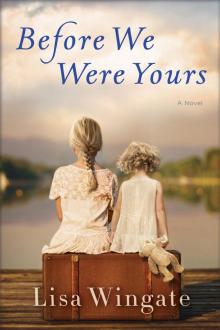 Before We Were Yours
Before We Were Yours A Sandy’s Seashell Shop Christmas
A Sandy’s Seashell Shop Christmas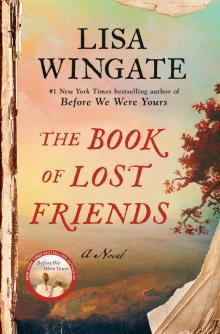 The Book of Lost Friends
The Book of Lost Friends Larkspur Cove
Larkspur Cove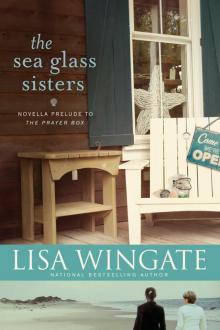 The Sea Glass Sisters
The Sea Glass Sisters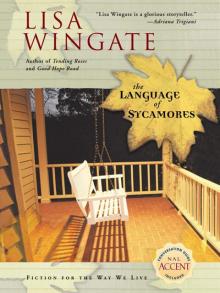 The Language of Sycamores
The Language of Sycamores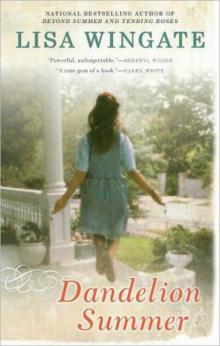 Dandelion Summer
Dandelion Summer Word Gets Around
Word Gets Around Beyond Summer
Beyond Summer Firefly Island
Firefly Island The Tidewater Sisters: Postlude to The Prayer Box
The Tidewater Sisters: Postlude to The Prayer Box Talk of the Town
Talk of the Town![Blue Sky Hill [01] A Month of Summer Read online](http://i1.bookreadfree.com/i1/03/29/blue_sky_hill_01_a_month_of_summer_preview.jpg) Blue Sky Hill [01] A Month of Summer
Blue Sky Hill [01] A Month of Summer A Thousand Voices
A Thousand Voices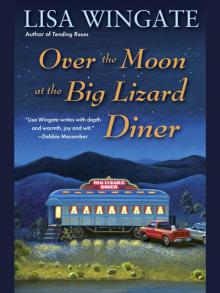 Over the Moon at the Big Lizard Diner
Over the Moon at the Big Lizard Diner Never Say Never
Never Say Never Good Hope Road
Good Hope Road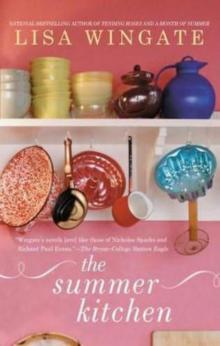 The Summer Kitchen
The Summer Kitchen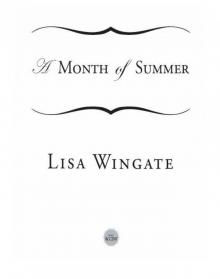 A Month of Summer
A Month of Summer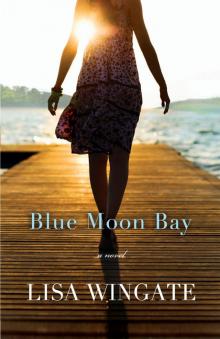 Blue Moon Bay
Blue Moon Bay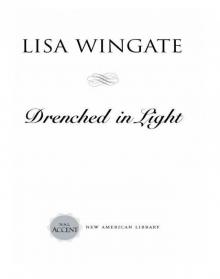 Drenched in Light
Drenched in Light The Sea Keeper's Daughters
The Sea Keeper's Daughters